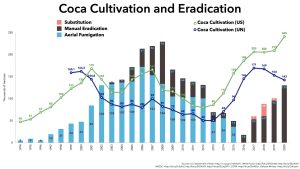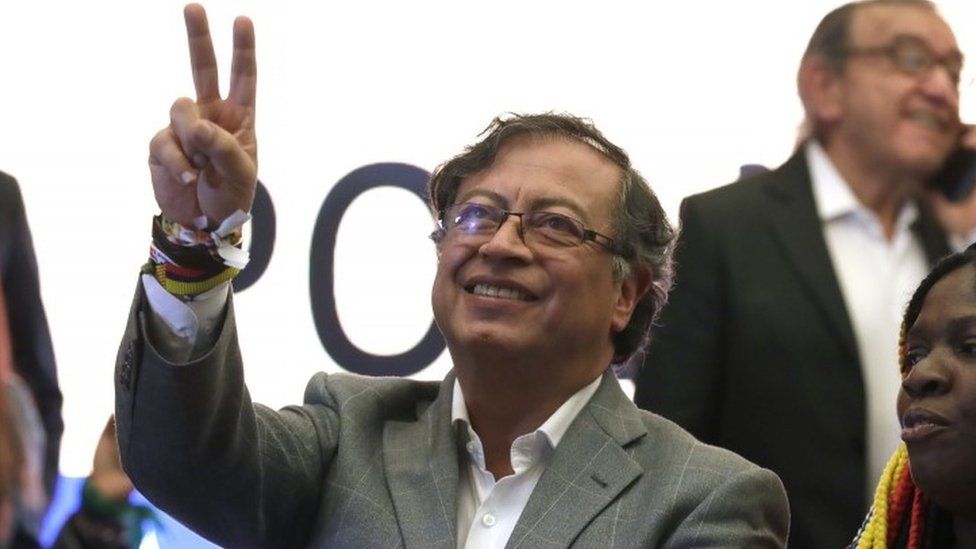The drug war failed. No longer is this a controversial statement. Despite this, it is continually implemented on a global scale. The recent election of Leftist President Gustavo Petro in Colombia may change things, however.
Colombian cocaine production is at an all-time high, according to a UN report, surpassing the infamous era of Pablo Escobar. Yet, Colombian drug policy has remained constant. Security driven tactics and the destruction of coca are the central aspects of the policy. Constantly, coca crops have been destroyed on land or via air, through chemical fumigation while drug traffickers are prosecuted and usually extradited to the US. This creates a Sisyphean cycle. The crops are replanted, and new individuals, from a pool of unemployed Colombians join the criminal world from the void of job opportunities.
The ground-breaking 2016 Peace Deal with the guerrilla group, and cocaine traffickers, the FARC, signified a sign of hope to break out of this Sisyphean drug policy. One central aspect of the deal was a commitment to a crop substitution program. The cultivation of coca leaf is done by farmers in rural Colombia. The cultivation of coca cultivation, compared to the likes of sugar, is vastly more profitable. It is rational, then, for farmers to cultivate coca. The substation programme offers farmers an alternative. They are given subsidies to cultivate licit crops. The programme was implemented limitedly, but when it was the effects were clear. The programme was much more effective than destroying the crops, a report revealed. Of the territory where farmers voluntarily removed coca, in order to plant subsidised crops, 98% of the territory remained coca free by 2020. However, as corruption and malfeascense, defining features of the Colombian state, persisted, farmers slowly began not receiving their subsidies and reverted back to coca. This graph demonstrates the quick decline of crop substitution and the return of the ineffective manual eradication and aerial fumigation.

A new future is on the horizon for Colombia. Petro is a vocal critique of the US drug war and its imposition on Colombia. He has made commitment to returning to a crop subsidy programme with particular focus on licit cannabis production. In 2016 Colombia legalised the production and sale of cannabis. Petro hopes to take advantage of a growing global cannabis market and create a green farming industry, which shifts farmers away from coca, towards licit cannabis. This is joined by a commitment to not restart the aerial fumigation of coca crops. Aerial fumigation is not only ineffective, but deeply harmful to rural communities and Colombian wildlife. The spraying of the glyphosate, a reportedly carcinogenic chemical, is said to contaminate water sources, destroy other licit crops and poisons livestock.
Petro has also committed to dealing with a foundation of Colombia’s coca industry, corruption. The corruption in Colombia occurs on every level, it is central to the functioning of the coca industry. Earlier this year, ‘Otoniel’, alleged leader of the powerful cocaine trafficking group ‘Clan Del Gulfo’, wanted to expose the generals, politicians and individuals across Colombia who were complicit in his trafficking activities upon his arrest. ‘Otoniel’ was quickly extradited to the US, which many believe, including Petro, was in order to save the previous government of a PR crisis before the recent election. Petro was adamantly against the extradition and was keen to hear Otoniel’s secrets. In fact, he may look to ban extradition as a tool of the drug war completely.
The desire to fight corruption is a monumental task for Petro. However, the reported fear, particularly in the military barracks of Colombia, show he is moving in the right direction. Petro may be the first President in decades to truly reveal the extent of corruption in Colombia and will undoubtedly be the first to truly try and tackle it. This is reflected in Petro’s desire for Otoniel to return and expose those corrupt generals and politicians.
During his victory speech Petro stated “We will not betray this electorate, which has cried out to the country…for Colombia to change from today.” Hope is rare in Colombian politics. This marks an opportunity for change, but will Petro keep his word?


